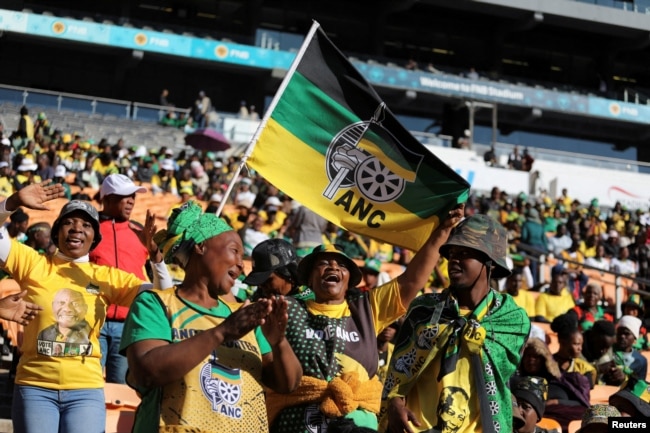The African National Congress appeared on course to lose the parliamentary majority it has held for 30 years, partial results from South Africa’s national election showed, in what would be the most dramatic political shift since the end of apartheid.
With results in from 16% of polling stations, the ANC’s share of the vote in Wednesday’s election stood at 42.6%, with the pro-business Democratic Alliance (DA) on 25.8% and the Marxist Economic Freedom Fighters (EFF) on 8.5%, data from the electoral commission showed.
If the final results were to resemble the early picture, the ANC would be forced to make a deal with one or more other parties to govern – a situation that could lead to unprecedented political volatility in the coming weeks or months.
“There will be checks and balances on the ANC power, but the ultimate risk is that the infighting could make governance ineffective,” said Simon Harvey, head of foreign exchange analysis at Monex Europe.
He added that the speed at which a coalition could be formed would be an indication of what was to come.
“If it is protracted, you may start to worry about a political gridlock going forward,” he said.
The uncertainty weighed on South African markets.
The rand slipped more than 1% against the U.S. dollar to hit its weakest level in four weeks while the wider equity index dropped more than 2% in its worst day in six weeks and the country’s international bonds lost as much as 1 cent in the dollar.
The ANC has won national elections held every five years since the landmark 1994 election, which marked the end of apartheid and the ascent of Nelson Mandela as president.

But since those heady days the ANC’s support has declined because of disillusionment over issues such as high unemployment and crime, frequent power blackouts and corruption.
Based on the early results, the ANC is projected to have roughly 42% of the vote when the count is over, according to the Council for Scientific and Industrial Research which was providing projections to the state broadcaster SABC.
In the previous election in 2019, the ANC won 57.5% of the vote, with 20.8% for the DA and 10.8% for the EFF, on a turnout of 66% of registered voters, which the commission has already said is likely to be higher this time.
The Zuma factor
Under South Africa’s constitution, the newly elected National Assembly will elect the next president.
With the ANC still on course to be the largest party, its leader Cyril Ramaphosa is likely to remain as the country’s president, although a poor showing could make him vulnerable to a leadership challenge from within party ranks.
The early results showed the ANC on 38%, the DA on 27.8%% and the EFF on 10.9% in the key province of Gauteng, which includes the country’s business capital Johannesburg and the sprawling townships of Soweto and Alexandra.
In KwaZulu-Natal, a populous eastern province where the major city of Durban is located, a new party led by former president Jacob Zuma, uMkhonto we Sizwe (MK), was performing strongly, with 42.7% of the vote versus 21.4% for the ANC.
Zuma was forced to quit as president in 2018 after a string of scandals and has since fallen out with the ANC leadership, leading him to throw his weight behind MK. The party, named after the ANC’s armed wing from the apartheid era, appeared to be costing both the ANC and the EFF votes, especially in KwaZulu-Natal.
By law, the electoral commission has seven days to declare full results, but in practice it is usually faster than that. In the last election, in 2019, voting took place on a Wednesday like this year and final results came on the Saturday. The new parliament must convene within 14 days of final results being declared and its first act must be to elect the nation’s president.
This means that if the ANC is confirmed to have lost its majority there could be two weeks of intense and complex negotiations to agree on how to form a new government.
VOA News
#Early #Results #South #Africas #Election #Show #ANC #Losing #Majority



